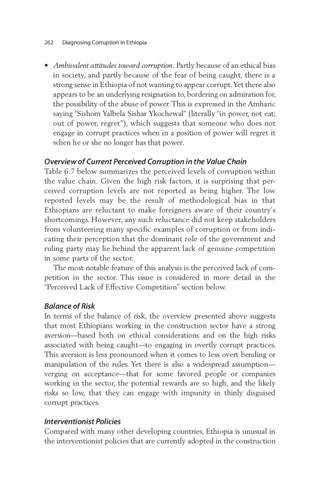262
Diagnosing Corruption in Ethiopia
• Ambivalent attitudes toward corruption. Partly because of an ethical bias in society, and partly because of the fear of being caught, there is a strong sense in Ethiopia of not wanting to appear corrupt. Yet there also appears to be an underlying resignation to, bordering on admiration for, the possibility of the abuse of power. This is expressed in the Amharic saying “Sishom Yalbela Sishar Ykochewal” (literally “in power, not eat; out of power, regret”), which suggests that someone who does not engage in corrupt practices when in a position of power will regret it when he or she no longer has that power.
Overview of Current Perceived Corruption in the Value Chain Table 6.7 below summarizes the perceived levels of corruption within the value chain. Given the high risk factors, it is surprising that perceived corruption levels are not reported as being higher. The low reported levels may be the result of methodological bias in that Ethiopians are reluctant to make foreigners aware of their country’s shortcomings. However, any such reluctance did not keep stakeholders from volunteering many specific examples of corruption or from indicating their perception that the dominant role of the government and ruling party may lie behind the apparent lack of genuine competition in some parts of the sector. The most notable feature of this analysis is the perceived lack of competition in the sector. This issue is considered in more detail in the “Perceived Lack of Effective Competition” section below.
Balance of Risk In terms of the balance of risk, the overview presented above suggests that most Ethiopians working in the construction sector have a strong aversion—based both on ethical considerations and on the high risks associated with being caught—to engaging in overtly corrupt practices. This aversion is less pronounced when it comes to less overt bending or manipulation of the rules. Yet there is also a widespread assumption— verging on acceptance—that for some favored people or companies working in the sector, the potential rewards are so high, and the likely risks so low, that they can engage with impunity in thinly disguised corrupt practices.
Interventionist Policies Compared with many other developing countries, Ethiopia is unusual in the interventionist policies that are currently adopted in the construction
